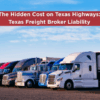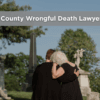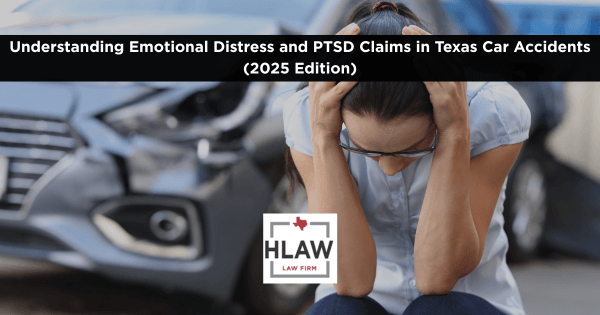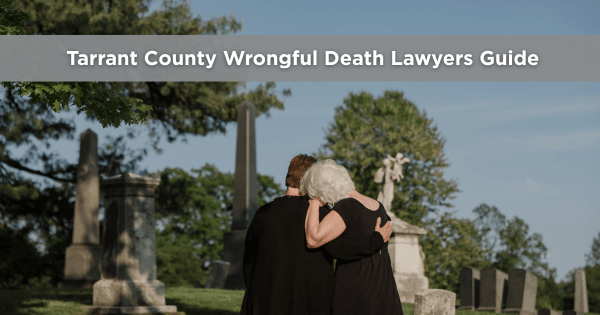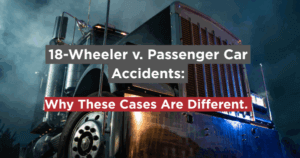
When an 18-wheeler collides with a passenger car, the results can be devastating. Learn why truck accident cases require specialized legal experience.
When a crash involves an 18-wheeler and a passenger car, the consequences are often life-changing. These cases are not simply larger versions of car accidents. They involve different physics, specialized federal trucking regulations, and complex legal claims.
At Howard Lotspeich Alexander & Williams, PLLC (HLAW), our team of experienced Texas truck accident lawyers understands what makes these cases unique. Below, we explain the key factors that set truck-car collisions apart—focusing on the physics of big rigs, the urgency of preserving evidence, and the often catastrophic injuries suffered by passenger–vehicle occupants.
The Physics of 18-Wheeler Accidents
A fully loaded commercial truck can weigh up to 80,000 pounds, compared to 3,000–4,000 pounds for an average car. That massive size and weight dramatically change how these crashes occur.
Momentum and Force
-
At highway speeds, an 18-wheeler generates 20–30 times more momentum than a passenger car.
-
The energy transferred in a collision is exponentially higher, often causing devastating crush injuries to those in the smaller vehicle.
Stopping Distances
-
A loaded tractor-trailer traveling at 65 mph may require 500–525 feet to stop—nearly two football fields.
-
Any speeding, downhill travel, or poorly maintained brakes can lengthen that distance, reducing the driver’s ability to avoid a collision.
Blind Spots and Turning Radius
-
Big rigs have large “no-zones”—blind spots on all four sides where cars can disappear from the truck driver’s view.
-
Their wide turning radius and long stopping distance make them less maneuverable, especially in city traffic.
These physical realities explain why 18-wheeler crashes often cause more severe property damage and injuries than typical car accidents.
Preserving Evidence in Commercial Truck Accident Claims
One of the biggest differences between a car-on-car accident and a trucking crash is the evidence involved—and how quickly it can disappear. A skilled 18-wheeler accident attorney acts fast to preserve critical proof.
Time-Sensitive Evidence
-
Electronic Logging Devices (ELDs): Show hours-of-service compliance and potential driver fatigue. Many carriers are only required to keep these for six months.
-
Event Data Recorders (Black Boxes): Record speed, braking, steering, and throttle use seconds before the crash—often overwritten if not retrieved promptly.
-
Maintenance and Inspection Records: Reveal whether the truck was safe to operate.
-
Driver Qualification Files: Can show patterns of negligent hiring or supervision.
-
Dispatch Notes and Bills of Lading: May expose unsafe schedules or pressure to meet deadlines.
-
Dashcams and Third-Party Surveillance Footage: Often deleted or recorded over within days.
Spoliation Letters
An experienced Texas truck accident lawyer will immediately send spoliation (evidence-preservation) letters to the trucking company and other parties. This legal step forces them to retain logs, electronic data, and other records that could prove negligence.
Failing to secure this evidence early can weaken a victim’s claim.
Why Injuries Are Typically More Severe
The immense force of a truck vs. car accident often leaves the smaller-vehicle occupants with catastrophic injuries. Common examples include:
-
-
Spinal cord injuries and paralysis
-
Crush injuries, amputations, and severe orthopedic fractures
-
Internal organ damage and internal bleeding
-
Severe burns from fuel-related fires or explosions
-
Extensive surgeries and hospital stays
-
Long-term rehabilitation and assistive devices
-
Home modifications for disability access
-
Significant lost income and diminished future earning potential
These injuries often result in commercial truck accident claims that are far more substantial than those arising from car-on-car collisions—reflecting both the financial and human toll.
Legal Complexities Unique to Truck Accidents
Unlike most car accidents, truck crashes often involve multiple liable parties, including:
-
The truck driver
-
The trucking company or motor carrier
-
Freight brokers or shippers that set unrealistic deadlines
-
Maintenance or repair contractors
-
Manufacturers of defective truck components
Trucking companies and their insurers are also subject to federal regulations enforced by the FMCSA (Federal Motor Carrier Safety Administration), covering hours of service, vehicle maintenance, and safety compliance.
These layers of liability and regulation make it essential to have a skilled 18-wheeler accident attorney who can identify all responsible parties and pursue every avenue of compensation.
Why You Need an Experienced Texas Truck Accident Lawyer
A serious truck crash is not just another motor-vehicle accident claim. It requires:
-
Immediate investigation and evidence preservation
-
Accident reconstruction experts to analyze skid marks, impact angles, and black-box data
-
Deep knowledge of federal trucking laws and safety standards
-
Experienced negotiation and trial skills to counter large insurance companies
At Howard Lotspeich Alexander & Williams, PLLC (HLAW), our attorneys understand how to build strong commercial truck accident claims by acting quickly, leveraging experts, and fighting for the full value of our clients’ damages.
Compassionate Support for Truck Accident Victims
After a severe truck accident, victims and their families often face a long recovery and enormous expenses. Our team is committed to handling the legal battle so you can focus on healing.
If you or a loved one has been hurt in a collision with a commercial truck or 18-wheeler, contact HLAW today for a free consultation. We’ll explain your rights and help you pursue the compensation you deserve.
About the Author
Jason Howard is a founding partner at Howard Lotspeich Alexander & Williams, PLLC (HLAW) in Fort Worth, Texas. A seasoned Texas truck accident lawyer and trial attorney, Jason has more than two decades of experience representing victims of catastrophic injuries and wrongful deaths caused by negligent drivers and trucking companies.
Recognized for his skill in the courtroom and his commitment to compassionate, client-focused advocacy, Jason has been named to Texas Super Lawyers every year since 2015. He draws on a deep understanding of both state and federal trucking regulations to build strong cases that hold commercial carriers accountable.
Beyond his legal achievements, Jason is committed to guiding injured clients and their families through every step of the recovery process—ensuring they feel supported, informed, and empowered.




